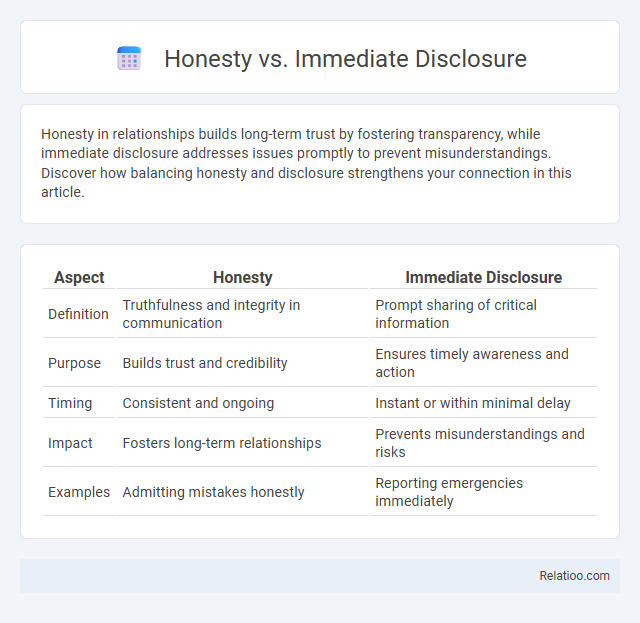Honesty in relationships builds long-term trust by fostering transparency, while immediate disclosure addresses issues promptly to prevent misunderstandings. Discover how balancing honesty and disclosure strengthens your connection in this article.
Table of Comparison
| Aspect | Honesty | Immediate Disclosure |
|---|---|---|
| Definition | Truthfulness and integrity in communication | Prompt sharing of critical information |
| Purpose | Builds trust and credibility | Ensures timely awareness and action |
| Timing | Consistent and ongoing | Instant or within minimal delay |
| Impact | Fosters long-term relationships | Prevents misunderstandings and risks |
| Examples | Admitting mistakes honestly | Reporting emergencies immediately |
Understanding Honesty and Immediate Disclosure
Honesty involves consistently providing truthful information, fostering trust and credibility in interpersonal and professional relationships. Immediate disclosure requires sharing relevant facts promptly, which can prevent misunderstandings but may sometimes need balancing with strategic timing for optimal impact. Understanding the nuances between honesty and immediate disclosure helps navigate ethical communication, ensuring transparency without compromising situational effectiveness.
Key Differences Between Honesty and Immediate Disclosure
Honesty involves consistently being truthful and transparent in communication, reflecting your integrity and trustworthiness. Immediate disclosure requires revealing information promptly, emphasizing timing over the broader value of honesty. Your challenge lies in balancing the ethical imperative of honesty with the strategic consideration of when to disclose information for optimal impact.
The Ethics of Withholding Information
Honesty requires a commitment to truthfulness, yet immediate disclosure may sometimes conflict with considerations of timing and potential consequences. The ethics of withholding information revolve around evaluating the impact on stakeholders, balancing transparency with sensitivity, and determining when delay serves a justifiable purpose. Ethical decision-making involves assessing whether withholding information compromises trust or protects individuals from harm.
Situational Factors Influencing Disclosure
Situational factors influencing disclosure include the nature of the information, the relationship between parties, and the potential consequences of sharing. Honesty promotes trust, but immediate disclosure may not always be appropriate due to timing or sensitivity of the situation. You must consider context carefully to balance transparency with prudence for optimal outcomes.
Psychological Impacts of Honesty vs Immediate Disclosure
Honesty fosters long-term trust and emotional security, whereas immediate disclosure can trigger acute stress and anxiety, especially in high-stakes situations. The timing of information release significantly influences psychological resilience and relationship dynamics, as premature disclosure may overwhelm the recipient, while delayed honesty can generate feelings of betrayal. Effective communication balances transparency with sensitivity to promote mental well-being and maintain interpersonal trust.
Professional Settings: When to Disclose Immediately
In professional settings, immediate disclosure is critical when information affects safety, legal compliance, or business reputation. Transparency about errors or conflicts of interest maintains trust and prevents escalation of issues. Delaying such disclosures can lead to legal consequences, damaged relationships, and loss of credibility.
Personal Relationships: Navigating Truth and Timing
Honesty in personal relationships builds trust by fostering transparency and emotional safety, while immediate disclosure can sometimes overwhelm or hurt, requiring careful consideration of timing. Effective communication balances revealing truths with empathy, ensuring partners feel respected and supported. Navigating the tension between honesty and timing enhances relational resilience and deepens emotional intimacy.
Advantages and Risks of Immediate Disclosure
Immediate disclosure ensures transparency and builds trust by providing Your audience with accurate and timely information, preventing misinformation and speculation. However, the risks include potential emotional distress, misinterpretation, and the possibility of harming relationships or strategic interests if sensitive details are revealed prematurely. Balancing honesty with thoughtful timing can protect reputations while maintaining credibility and openness.
Strategies for Balancing Honesty with Sensitivity
Balancing honesty with sensitivity requires carefully timing the disclosure of information to maintain trust while minimizing emotional harm. Strategies include assessing the recipient's emotional state, choosing an appropriate setting for the conversation, and delivering facts with empathy and clarity. Prioritizing transparency alongside compassion helps create a supportive environment where difficult truths are understood and accepted.
Finding the Right Moment: Best Practices for Disclosure
Finding the right moment for disclosure involves balancing honesty with strategic timing to ensure clarity and reception. Best practices recommend assessing the emotional state of the recipient and the context to avoid premature or harmful revelations. You can foster trust and minimize misunderstandings by choosing moments when communication is most effective and appropriate.

Infographic: Honesty vs Immediate Disclosure
 relatioo.com
relatioo.com